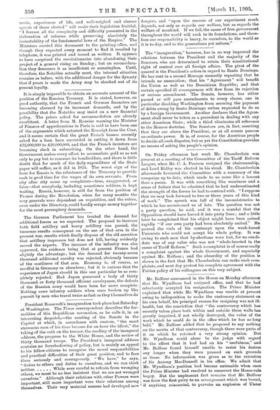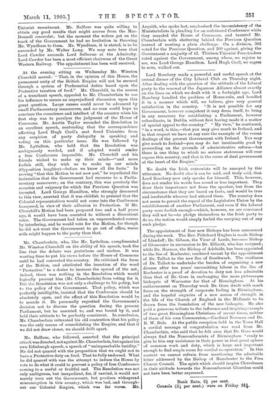Mr. Balfour announced in the House on Monday afternoon that
Mr. Wyndham had resigned office, and that he had reluctantly accepted his resignation. The Prime Minister explained that while Mr. Wyndham was unable at present owing to indisposition to make the customary statement on his own behalf, his principal reason for resigning was not ill- health, but the conviction that " the controversy which has recently taken place both within and outside these walls has greatly impaired, if not wholly destroyed, the value of the work which he could do in the office which be has so long held." Mr. Balfour added that he proposed to say nothing on the merits of that controversy, though there were parts of it on which he retained a very strong opinion. But Mr. Wyndham could alone be the judge with regard to the effect that it had had . on his " usefulness," and Mr. Balfour found himself unable to resist his desires any longer when they were pressed on such grounds as these. No information was given as to the retention of Sir Antony MacDonnell in his office. We admit that Mr. Wyndham's position bad become untenable when once the Prime Minister had resolved to resurrect the Home-rule bogey. But the unpleasant fact remains that Mr. Balfour was from the first privy to an arrangement which was bound, if anything miscarried, to provoke an explosion of Ulster Unionist resentment. Mr. Balfour was quite willing to obtain any good results that might accrue from the Mac- Donnell concordat; but the moment the wolves got on the track of the Government he had no hesitation in throwing Mr. Wyndham to them. Mr. Wyndham, it is stated, is to be succeeded by Mr. Walter Long. We may note here that Lord Cawdor succeeds Lord Selborne at the Admiralty. Lord Cawdor has been a most efficient chairman of the Great Western Railway. The appointment has been well received.











































 Previous page
Previous page